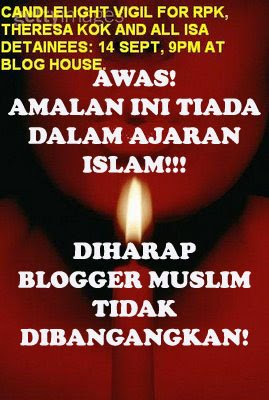NASIHAT KEPADA BLOGGER MUSLIM
 gambar diedit dari sini
gambar diedit dari siniهريماو مناءيڤ مولاكن دڠن بسم الله الرحمن الرحيم
Vigil; suatu istilah/frasa yang tidak pernah Harimau dengar dari mulut Ustazah, Ustaz mahupun Abah Harimau sejak dari kecil. Akhir-akhir ini, terlalu banyak pesta lilin ini dianjurkan oleh blogawan dengan alasan kononnya sebagai simbol kesedihan terhadap tahanan ISA.
Buat blogawan beragama Islam, 'pesta vigil' ni, Abah korang ke yang ajar? Bukankah ini amalan agama bukan Islam? Jangan jadi bodoh dan bangang semata-mata kerana terikut-ikut.
__________________________________________
source/sumber rujukan : wikipedia
Vigil : A vigil (from the Latin vigilia, meaning wakefulness) is a period of purposeful sleeplessness, an occasion for devotional watching, or an observance.
It can also be the eve of a religious festival observed by staying awake as a devotional exercise or ritual devotions observed on the eve of a holy day [1], such as the Easter Vigil held on Holy Saturday. In the Eastern Orthodox Church an All-Night Vigil is held on the eves of Sundays and all major feasts during the liturgical year.
In Christianity, especially the Eastern Orthodox and Roman Catholic traditions, a vigil is often held when someone is gravely ill or dying. Prayers are said and votives are often made. Vigils extend from eventual death to burial, ritualistically to pray for a loved one, but more practically so they are never alone.
During the Middle Ages, a squire on the night before his knighting ceremony was expected to take a cleansing bath, fast, make confession, and then hold an all-night vigil of prayer to God in the chapel, readying himself for his life as a knight. He would dress in white, which was the symbol for purity.
When a Jew dies, a watch is kept over the body and Tehillim are recited constantly, until the burial service.
It can also be the eve of a religious festival observed by staying awake as a devotional exercise or ritual devotions observed on the eve of a holy day [1], such as the Easter Vigil held on Holy Saturday. In the Eastern Orthodox Church an All-Night Vigil is held on the eves of Sundays and all major feasts during the liturgical year.
In Christianity, especially the Eastern Orthodox and Roman Catholic traditions, a vigil is often held when someone is gravely ill or dying. Prayers are said and votives are often made. Vigils extend from eventual death to burial, ritualistically to pray for a loved one, but more practically so they are never alone.
During the Middle Ages, a squire on the night before his knighting ceremony was expected to take a cleansing bath, fast, make confession, and then hold an all-night vigil of prayer to God in the chapel, readying himself for his life as a knight. He would dress in white, which was the symbol for purity.
When a Jew dies, a watch is kept over the body and Tehillim are recited constantly, until the burial service.
Vigils : Vigils is a term for night prayer in ancient Christianity. See Vespers, Compline, Nocturns, Matins, and Lauds for more information. A Vigil is a night spent in prayer.
A Roman Catholic Mass that counts liturgically for a Sunday or Holy Day but which takes place the previous evening is often mistakenly called a Vigil Mass. But it is more accurately termed an "anticipated Mass," because a Vigil is actually the whole day prior to certain major feasts, which acts as sort of Western version of the forefeast. And such Vigils (such as Christmas Eve) have their own proper Mass theoretically said that morning.
A Roman Catholic Mass that counts liturgically for a Sunday or Holy Day but which takes place the previous evening is often mistakenly called a Vigil Mass. But it is more accurately termed an "anticipated Mass," because a Vigil is actually the whole day prior to certain major feasts, which acts as sort of Western version of the forefeast. And such Vigils (such as Christmas Eve) have their own proper Mass theoretically said that morning.
All-night vigil : The All-night vigil is a service of the Eastern Orthodox Church consisting of an aggregation of the three canonical hours of Vespers, Matins, and the First Hour. The vigil is celebrated on the eves of Sundays and of major liturgical feasts.[1]
The vigil has been set to music most famously by Sergei Rachmaninoff, whose setting of selections from the service is one of his most admired works. Other musical settings include those by Chesnokov, Grechaninov, Ippolitov-Ivanov, Alexander Kastalsky[2], and Einojuhani Rautavaara. It is most often celebrated using a variety of traditional or simplified chant melodies based on the Octoechos or other sources.
HARIMAU MENAIP
The vigil has been set to music most famously by Sergei Rachmaninoff, whose setting of selections from the service is one of his most admired works. Other musical settings include those by Chesnokov, Grechaninov, Ippolitov-Ivanov, Alexander Kastalsky[2], and Einojuhani Rautavaara. It is most often celebrated using a variety of traditional or simplified chant melodies based on the Octoechos or other sources.
HARIMAU MENAIP








(1).png)

No comments
Post a Comment